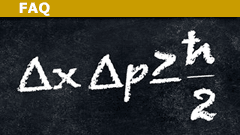Does the Heisenberg Uncertainty Principle Imply Energy Nonconservation?
The short answer is: no, there’s no violation.
The longer answer can be this: Given the probabilistic aspect of quantum theory, what do we mean now, by “conservation of energy”?
In quantum theory, it can be expressed in two different ways. The first way is this: A state with a precisely known energy will always keep this energy. The reason is that a state with a precisely known energy is an eigenstate of the Hamiltonian, and that’s a stationary state under unitary evolution: so it remains (up to a phase factor) itself.
The second way goes as follows: for a given state, look at its EXPECTATION VALUE of the energy <psi | H | psi>. This is the statistical average over many trials of measuring energy. Well, this expectation value is to remain the same during time evolution. It simply means that the energy value was not a well-defined quantity (only its expectation value was), and hence we cannot talk about violation of its conservation, given that it wasn’t fixed initially.
And where does the time-energy uncertainty relationship come in?
It tells you essentially that *in order to perform an energy measurement with precision dE*, you will need to measure (to have your measurement apparatus interact with) the system for a time of at least dt.
So this means that when you are discussing a system for a timeless than dt, that there is no visible difference between a stationary state with precisely energy E, or with a superposition of stationary states of which the energy eigenvalues lie within dE of E. Indeed, below a time dt, the unitary evolution equation (Schroedinger equation integrated) will not have altered significantly the phases between these contributions as can easily be verified (each term taking a factor exp(-i E t / hbar) ).
So you’re not able to find out the difference between the two situations, and hence you cannot know whether the system is in such a superposition, or in a precise energy eigenstate. As such, the uncertainty is a matter of uncertainty on the INITIAL condition (was the system in a pure energy state or not ?) or of the energy transfer during the measurement interaction between apparatus and system. It is not a question of “stealing energy from nowhere” or something of the kind.
There are two typical cases:
1) the system was “created” in a time dt. This means that during its “creation interaction” one cannot be sure that it was in a pure energy eigenstate: it could be created in a superposition of eigenstates with eigenvalues spread over dE. So you measuring (precisely) the energy value just means you selected out one of the possible eigenstates of which the system was in a superposition: no violation of conservation of energy. This is often the case with “particle resonances” or other short-lived phenomena.
2) The system is *prepared* in a precise energy eigenstate, and you quickly measure, during time dt. In this case, it can be shown that the interaction between the system and the measurement apparatus can give rise to a transfer of energy of the order of dE. So reading again another value (within dE) of the energy is then just part of the “perturbation” introduced by the energy measurement apparatus. Again no violation of energy conservation.
Finally, in the long run, the *expectation value* will be recovered, as the average of a great many numbers of measurements. So there will never be a net gain or loss of energy.
Contributions by: vanesch
This article was authored by several Physics Forums members with PhDs in physics or mathematics.








[QUOTE=”ZapperZ, post: 5270839, member: 6230″]Actually, full credit for this entry should be given solely to vanesch. I merely reposted what he wrote for the original FAQ.
Zz.[/QUOTE]
Thanks, corrected
Actually, full credit for this entry should be given solely to vanesch. I merely reposted what he wrote for the original FAQ.
Zz.